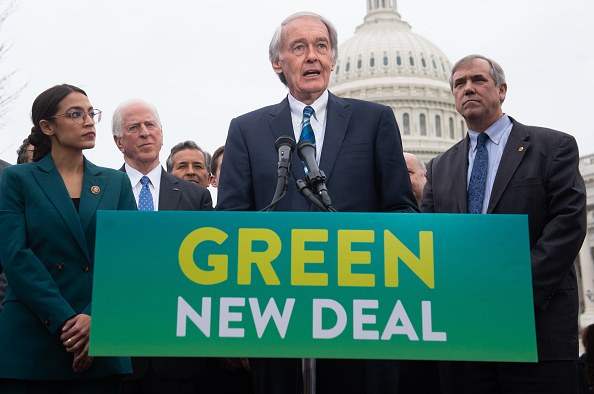As the contest for Democratic presidential nominee gains steam, several progressive voices within the party have floated aggressive proposals for tax increases, healthcare expansions, and realigning U.S. foreign policy. The initiatives have drawn broad and sometimes sharp criticism from more centrist elements of the party’s leadership, highlighting a contest underway with implications for the country and the world.
LEFTWING DEMOCRATS CALL FOR SWEEPING ECONOMIC CHANGES
Leaders in the progressive wing of the Democratic party have proposed ambitious changes to America’s healthcare and educational system. Senator Bernie Sanders of Vermont, a leading contender for the presidency, has been calling on the party to embrace “Medicare for All,” a phrase usually understood to signify a single-payer healthcare system funded by the federal government. Ten senators of the 16 now running have embraced the plan, estimated by the Mercatus center to cost over $32 trillion over ten years.
In the House of Representatives, the policy agenda for the new Congress was largely dominated by debate over the “Green New Deal” propounded by freshman congressional representative Alexandria Ocasio Cortez of New York. It is a far-reaching series of proposals to overhaul environmental regulations and reduce carbon emissions. In a move indicative of its appeal within the party’s progressive wing, five Presidential candidates hastened to endorse the plan before it had been fully released.
Several candidates have also proposed significant tax increases in order to fund new spending on healthcare and education. Beginning in January, Ocasio Cortez called for a 70 percent income tax rate on incomes over $10 million. Others have followed her lead. In the same month, Senator Warren of Massachusetts proposed a wealth tax of 2 percent on Americans with more than $50 million in assets. Senator Sanders of Vermont, for his part, has endorsed a 52 percent income tax rate on top-bracket earners.

MODERATE DEMOCRATS PUSH BACK
The first of these progressive initiatives to garner significant opposition was the Green New Deal. While leftwing activists proved eager to embrace the plan, Congressional Democratic leadership showed markedly less enthusiasm. House Speaker Nancy Pelosi dismissed the plan as “one of several or maybe many suggestions that we receive,” adding, “The green dream or whatever they call it, nobody knows what it is, but they’re for it, right?” When the Green New Deal came up for a vote in the Senate, it garnered no votes, with 43 Democrats voting present.
Key centrist contenders have taken similar stances on progressives’ healthcare and education initiatives. On education, Senator Amy Klobuchar of Minnesota, during a CNN town hall meeting, declined to endorse Bernie Sanders’ proposals to make college tuition free, saying, "If I was a magic genie and could give that to everyone and we could afford it, I would.”
Likewise, former Congressman Robert “Beto” O’Rourke, previously considered one of the leading contenders for the nomination, reversed his earlier support for Senator Sanders’ single-payer healthcare, explaining that he is “no longer sure” single payer is the “fastest way to get us” to universal coverage.
Other primary contenders and their allies have also moved to distance themselves from progressives’ more audacious ideas. One of Vice President Joe Biden’s allies, former Delaware Gov. Jack Markell, recently summed up many criticisms of the party’s leftward drift: “The only way that Trump can win is if the nominee is too far to the left.” Asked how he defined “too far left,” Markell said, “The giving-everything-away-for-free lane” of the party.
FOREIGN POLICY SCHISMS
Key differences have also emerged between moderate and progressive camps within the Democratic party on foreign policy. Leading in the progressive camp, Senator Sanders has called for significant cuts in U.S. military spending and a triangulation between traditional U.S. allies like Israel and Saudi Arabia on the one hand and their adversaries, notably Iran, on the other. In a recent interview, Sanders denounced “a bipartisan assumption that we’re supposed to love Saudi Arabia and hate Iran.” He argued that the U.S. should play a more neutral role between the two countries: “We’re not going to be spending trillions of dollars and losing American lives because of your long-standing hostilities.”
Other Democrats, such as Kamala Harris, Beto O’Rourke and Joe Biden, have steered clear of such rhetoric, instead sounding more traditional notes about bolstering U.S. global leadership. Harris and O’Rourke have often claimed that President Trump has diminished U.S. standing abroad and shown undue deference to Russian President Vladimir Putin. Most Democratic presidential hopefuls have advocated — in general terms, at least — restoring frayed ties with European allies while taking a more aggressive posture towards Russia.
Resolution to these and other issues is unlikely to come soon. The party is undergoing a protracted contest for leadership that will take at least a year to play out in full. Whoever prevails — whether a progressive, a moderate, or a hybrid candidate — will set the Democrats’ agenda for 2020 and beyond.









